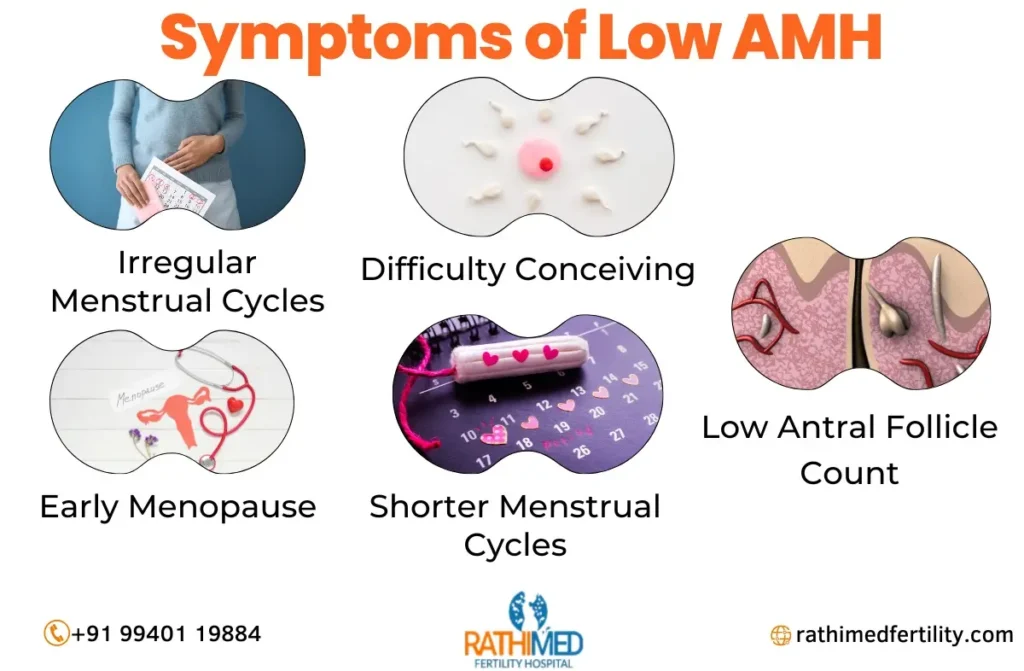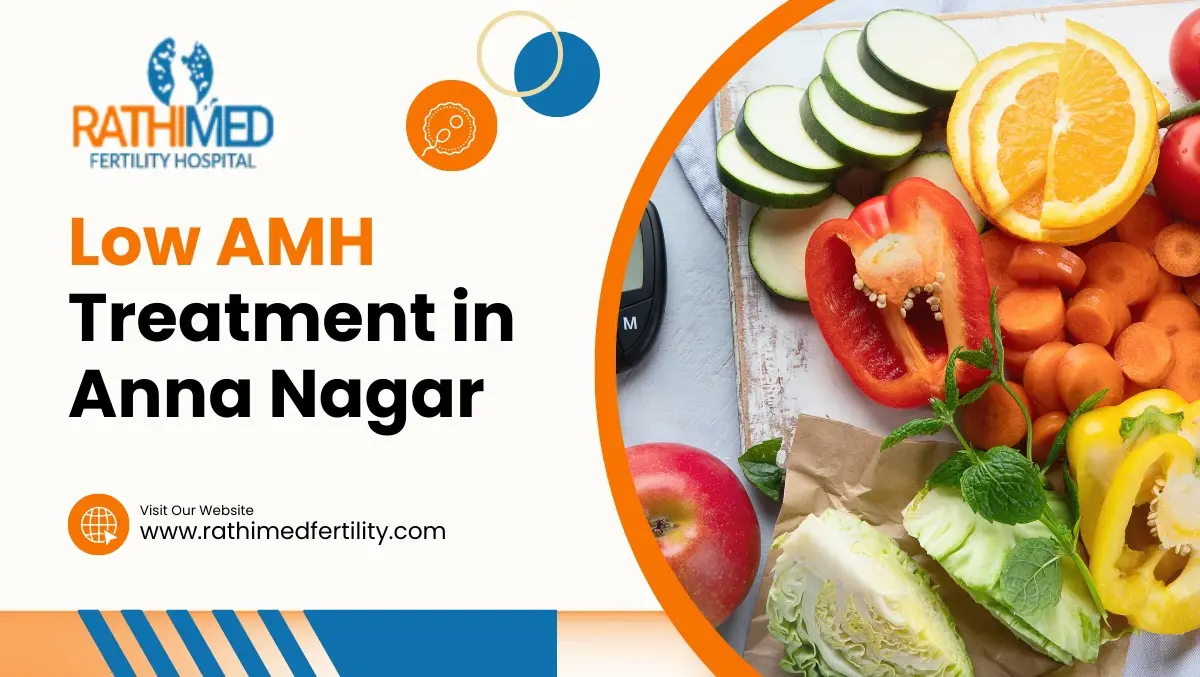In Anna Nagar, addressing low AMH levels is crucial for individuals aspiring to conceive. Low AMH treatment in Anna Nagar encompasses various advanced fertility interventions tailored to optimize ovarian function and enhance fertility prospects. With specialized care and cutting-edge technologies available, individuals facing this challenge can find hope and support on their journey towards parenthood.
Understanding Low AMH and Its Significance
What is Low AMH?
Low AMH, or Anti-Müllerian Hormone, is a hormone produced by ovarian follicles, indicating ovarian reserve. Low AMH levels suggest diminished fertility potential. In Anna Nagar, understanding Low AMH Treatment in Anna Nagar is crucial for individuals facing fertility challenges. Consulting with a fertility specialist can provide insights into Low AMH Treatment in Anna Nagar and personalized strategies to address this condition effectively.

Importance of Addressing Low AMH Treatment in Anna Nagar
Low AMH levels signify diminished ovarian reserve, posing significant challenges to fertility. Addressing this condition is crucial for individuals aspiring to conceive, particularly in Anna Nagar, where specialized care is available. Here’s why addressing Low AMH Treatment in Anna Nagar is essential:
- Optimizing Fertility Prospects: Treating low AMH levels can enhance fertility prospects by improving ovarian function and egg quality.
- Increasing Conception Chances: Effective treatment can increase the likelihood of successful conception, even in individuals with low AMH.
- Reducing Fertility Stress: Addressing low AMH can alleviate stress associated with fertility challenges, offering hope and reassurance to couples.
- Access to Specialized Care: In Anna Nagar, individuals can access specialized care tailored to address low AMH levels, maximizing the chances of a successful pregnancy.
- Enhancing Reproductive Health: Treatment for low AMH can contribute to overall reproductive health, fostering a positive environment for conception and pregnancy.
Consulting with a fertility specialist in Anna Nagar is essential for personalized evaluation and tailored treatment plans to address low AMH effectively.
Symptoms of Low AMH
Symptoms of low AMH (Anti-Mullerian Hormone) levels may not manifest directly as noticeable symptoms, but rather are indicative of reduced ovarian reserve and potential fertility challenges. Women with low AMH might experience:
- Difficulty conceiving
- History of recurrent miscarriages
- Decreased response to ovarian stimulation during fertility treatments
However, low AMH levels themselves do not cause specific symptoms like irregular periods or hormonal imbalances. Seeking treatment for low AMH in Anna Nagar involves comprehensive fertility evaluations and personalized management plans to address these underlying issues and optimize fertility outcomes.
Causes of Low AMH
Low AMH levels, indicating reduced ovarian reserve, can stem from various causes:
- Age: Natural decline in egg count with age, especially after mid-30s.
- Diet: Poor diet and obesity negatively impact AMH.
- Endometriosis: Causes inflammation and damage to ovaries.
- PCOS Treatment: Hormonal imbalances affect ovarian function.
- Genetics: Family history of low AMH or early menopause.
- Autoimmune Diseases: Immune system attacks ovarian cells.
- Cancer Treatment: Chemotherapy damages ovarian follicles.
- Mental Health: Chronic stress disrupts hormonal balance.
- Lifestyle: Smoking, obesity, pollution, and vitamin D deficiency.
Treatment with Low AMH Level
- Fertility Evaluation: Initial assessment to determine ovarian reserve and overall fertility health.
- Hormone Therapy: Use of medications like DHEA or estrogen to improve egg quality and increase AMH levels.
- IVF with Stimulation Protocols: Customized IVF treatments with specific stimulation protocols to maximize egg retrieval.
- Egg Freezing: Preserving eggs for future use if immediate pregnancy is not planned.
- Donor Eggs: Option to use donor eggs for higher success rates in conception.
- Lifestyle Modifications: Diet, supplements, and stress management to support fertility.
- Specialized Care: Consult with experts in Low AMH Treatment in Anna Nagar for personalized fertility solutions.
How to Increase AMH Levels
Anti-Müllerian Hormone (AMH) levels are crucial for assessing a woman’s ovarian reserve, which directly impacts fertility. While AMH levels naturally decline with age, certain lifestyle changes and treatments may help improve or maintain these levels:
- Balanced Diet: Consuming a diet rich in antioxidants, omega-3 fatty acids, and folate can support ovarian health. Include foods like leafy greens, fish, nuts, and berries.
- Supplements: DHEA (Dehydroepiandrosterone) and CoQ10 are often recommended to improve ovarian function and potentially increase AMH levels.
- Stress Management: Chronic stress can negatively impact hormone levels. Practices like yoga, meditation, and deep breathing exercises can help manage stress.
- Regular Exercise: Moderate physical activity enhances overall health and supports hormone balance, which may positively affect AMH levels.
- Avoid Toxins: Limiting exposure to environmental toxins, such as BPA and phthalates, is essential for maintaining healthy ovarian function.
For personalized advice and treatment options, consider consulting with a specialist in Low AMH Treatment in Chennai.
How much vitamin D to increase AMH?
There is no universally recommended dosage of vitamin D specifically to increase AMH levels. However, studies suggest that women with low AMH may benefit from taking 2000-4000 IU of vitamin D daily. It’s crucial to consult a healthcare provider to determine the right dosage based on your individual needs.
Can folic acid increase AMH?
Folic acid is crucial for general reproductive health, but no direct evidence shows that it increases AMH levels. However, folic acid supports ovarian function and overall fertility, making it a beneficial supplement during fertility treatments. Consult your doctor about combining folic acid with other treatments for low AMH.
Which fruits increase AMH levels?
Fruits like berries, oranges, and avocados are rich in antioxidants, vitamins, and healthy fats that may support reproductive health. While no specific fruit is proven to directly increase AMH, a balanced diet with nutrient-rich fruits can improve overall fertility and ovarian function.
Low AMH and Fertility Issues
Low AMH levels can be a concerning indicator of diminished ovarian reserve, which may affect a woman’s ability to conceive. Understanding the implications and available treatments is vital:
- Impact on Fertility: Low AMH levels suggest a reduced number of viable eggs, which can make natural conception more challenging.
- Early Diagnosis: Women with low AMH levels may experience earlier menopause, making timely fertility evaluation and intervention crucial.
- Fertility Treatments: IVF (In Vitro Fertilization) is often recommended for women with low AMH. Tailored protocols and ovarian stimulation can help maximize egg retrieval.
- Egg Freezing: For those not ready to conceive, egg freezing is a viable option to preserve fertility.
- Consultation with a Specialist: Seeking expert guidance for Low AMH Treatment in Chennai can provide personalized strategies to enhance fertility and improve chances of conception.
These insights can help women with low AMH navigate their fertility journey with the support of advanced treatment options.
Low AMH Treatment Cost in Anna Nagar
Understanding Treatment Expenses
In Anna Nagar, comprehending Low AMH Treatment Cost in Anna Nagar is crucial for individuals seeking fertility interventions. Treatment expenses can vary based on several factors:
- Consultation Fees: Initial consultations with fertility specialists may incur fees for evaluations and discussions regarding treatment options.
- Diagnostic Tests: Costs associated with diagnostic tests to assess ovarian reserve and hormone levels.
- Medication Costs: Expenses for prescribed medications aimed at stimulating follicular development or regulating hormone levels.
- Procedure Fees: Costs for assisted reproductive technologies (ART) procedures such as IVF, including egg retrieval, embryo transfer, and laboratory services.
- Additional Costs: Miscellaneous expenses such as anesthesia, embryo freezing, and follow-up consultations.
Understanding these expenses enables individuals to plan and budget effectively for Low AMH Treatment in Anna Nagar. Consulting with healthcare providers can provide clarity on specific costs and financial assistance options available.
Factors Influencing Cost
Factors influencing the cost of low AMH (Anti-Müllerian Hormone) treatment in Anna Nagar include:
- Clinic Reputation: Established clinics may charge higher fees.
- Treatment Type: Costs vary based on the specific fertility treatments (IVF, IUI, etc.).
- Diagnostic Tests: Initial and ongoing tests add to the total expense.
- Medication: Hormonal treatments and other prescribed medications.
- Doctor’s Expertise: Experienced specialists often have higher consultation fees.
- Facility Fees: Charges for the use of medical facilities and equipment.
- Additional Services: Counseling, follow-up appointments, and support services.
- Insurance Coverage: Extent of coverage provided by health insurance policies.
Conclusion
In Anna Nagar, the journey towards parenthood for individuals with low AMH levels is marked by hope and advanced medical interventions. With specialized care tailored to address specific fertility challenges, couples can navigate the complexities of low AMH treatment in Anna Nagar. By embracing these opportunities and seeking support from experienced professionals, individuals can embark on their fertility journey with confidence, knowing that effective solutions are within reach.
Read also Best Fertility Hospital in Chennai.


